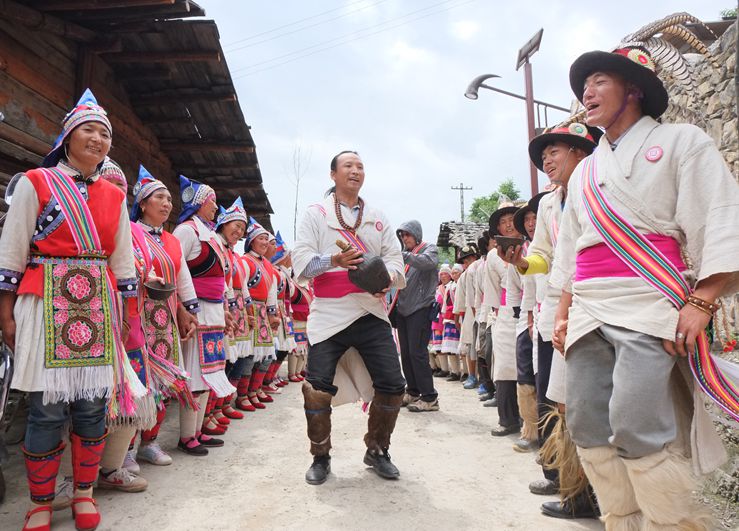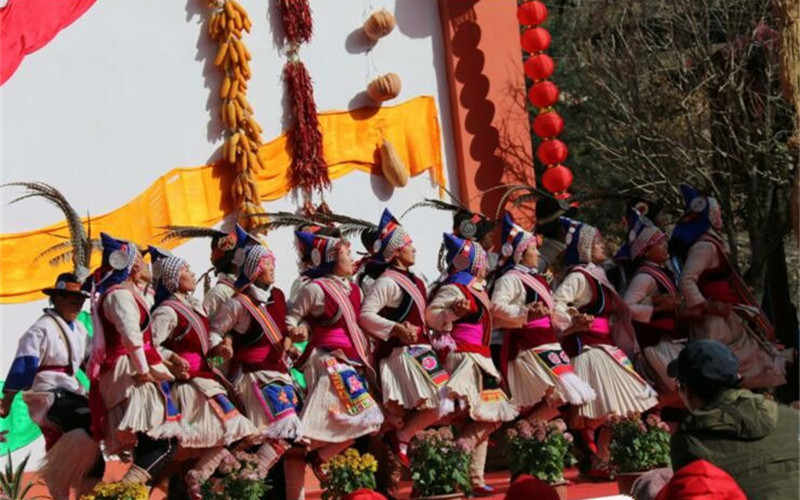
Weixi County Festivals and Events
As the main minority inhabited in Weixi County, Lisu people created brilliant culture and customs, among which the unique traditional festivals of Lisu Group enjoy good fame and attract tourists home and abroad to visit.
1. Kuoshi (阔什)
In Weixi County is an intimate festival known as Kuoshi. It is a way to welcome spring time. It usually lasts for a couple of days, though in some places the affair can be good for an entire month. Like the other festivals, there will be a lot of dancing and singing, with men and women garbed in their traditional costumes. They also create their rice wines by preparing them over sand. Interestingly, the wines are served in bowls, which are then shared by two people. Even if you are a foreigner you can join the celebration and partake with the wine.
2. Sword Ladder Climbing Festival (刀杆节)
Ever climbed up a swaying pole over thirty-six sharpened machete-blades on your bare feet? Well, if you cant not cut out to be a Lisu man. In Lunma Village, every year, Lisu men climb the sword pole on the occasion of the Daogan, or Sword Pole. Yes, it hurts. No, no-one really get injured. How come? Well, you have to be a Lisu man to do it.
3. Shouhuo (Harvest) Festival (收获节)
The Shouhuo (Harvest) Festival of Lisu Ethnic Minority is generally held every September and October of the lunar calendar. The biggest activity of the Harvest Festival is that everyone is making wine and has a taste of what is just in season. Some people even go to the ground and harvest and drink wine, accompanied by singing and dancing, they often go all night and enjoy themselves.
4. Thanksgiving Day (感恩节)
More than 100 years ago, the missionaries brought Thanksgiving Day to Lisu people. Nowadays, it has become a folk festival cherished by the monks, and the national characteristics are rich. The dates for Thanksgiving Day are different in different churches and regions, which will be customized according to the harvest time or the situation in the village, but generally after the autumn harvest.

 7 Days GolfingTour
7 Days GolfingTour
 8 Days Group Tour
8 Days Group Tour
 8 Days Yunnan Tour
8 Days Yunnan Tour
 7 Days Shangri La Hiking
7 Days Shangri La Hiking
 11 Days Yunnan Tour
11 Days Yunnan Tour
 6 Days Yuanyang Terraces
6 Days Yuanyang Terraces
 11 Days Yunnan Tour
11 Days Yunnan Tour
 8 Days South Yunnan
8 Days South Yunnan
 7 Days Tea Tour
7 Days Tea Tour
 8 Days Muslim Tour
8 Days Muslim Tour
 12 Days Self-Driving
12 Days Self-Driving
 4 Days Haba Climbing
4 Days Haba Climbing
 Tiger Leaping Gorge
Tiger Leaping Gorge
 Stone Forest
Stone Forest
 Yunnan-Tibet
Yunnan-Tibet
 Hani Rice Terraces
Hani Rice Terraces
 Kunming
Kunming
 Lijiang
Lijiang
 Shangri-la
Shangri-la
 Dali
Dali
 XishuangBanna
XishuangBanna
 Honghe
Honghe
 Kunming
Kunming
 Lijiang
Lijiang
 Shangri-la
Shangri-la
 Yuanyang Rice Terraces
Yuanyang Rice Terraces
 Nujiang
Nujiang
 XishuangBanna
XishuangBanna
 Spring City Golf
Spring City Golf
 Snow Mountain Golf
Snow Mountain Golf
 Stone Mountain Golf
Stone Mountain Golf














